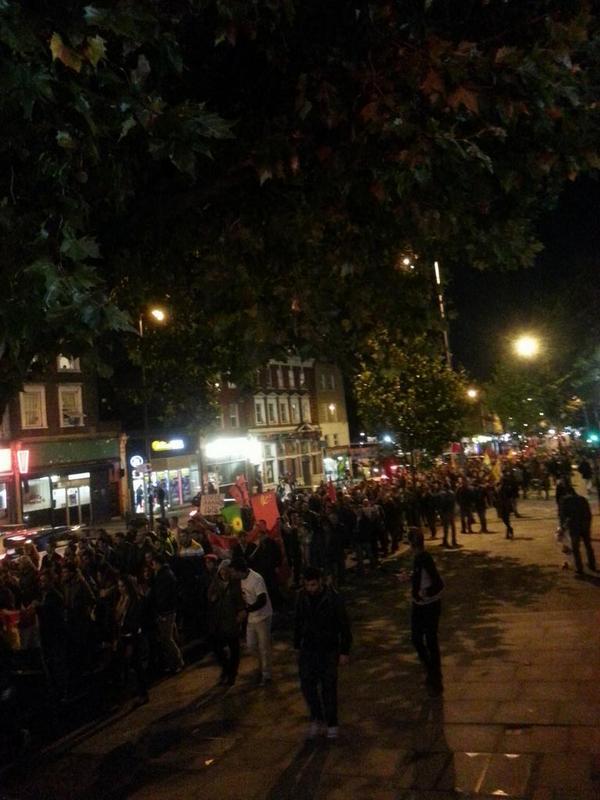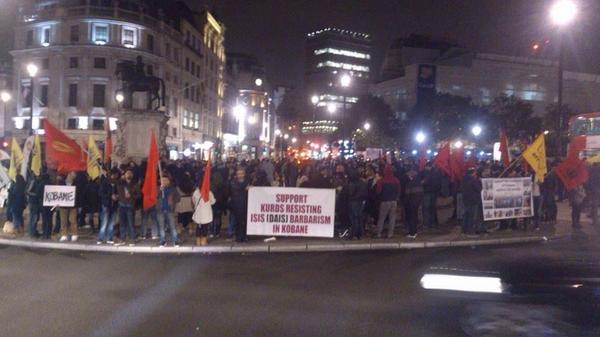Suli
"Do you get parents evening at uni?"
- Joined
- Feb 26, 2014
- Messages
- 5,355
Protests in London too. I had no idea that Kurds were so patriotic.



It's happening in so many cities across the world.
Protests in London too. I had no idea that Kurds were so patriotic.



It actually looks to me like today was a positive day in the conflict, not a negative one. Hopefully the good trend continues, fingers crossed.A lot more people have been saying it from today though
YPG are clearing the town of these rats, YPG are on the offensive tonight with many effective operations on all fronts. Air strikes highly effective.It actually looks to me like today was a positive day in the conflict, not a negative one. Hopefully the good trend continues, fingers crossed.
Are you rooting for the coalition that are lead by the Yanks?! Now I've seen it all.It actually looks to me like today was a positive day in the conflict, not a negative one. Hopefully the good trend continues, fingers crossed.
What? When were you when I posted this two months ago?Are you rooting for the coalition that are lead by the Yanks?! Now I've seen it all.
Not sure why some people are "confused" here. I don't think it's that difficult.
Here is the story in short. The US has funded ISIS in Syria (through the "moderate fractions" which end up with ISIS). It's also hard to believe they didn't know that, considering McCain himself was caught in an oops moment after only one meeting with the "moderate rebels" that went public.
The US does not want ISIS to spread in Iraq, for the US Iraq is some sort of "collateral damage" we all knew would happen, and it's hard to imagine the US didn't.
The US is not "friends with terrorists", but they are ready to fund them every now and then to do a much needed job for them. They have done it Afghanistan, and now they're doing it in Syria. (and that's the biggest part most people criticize the US for).
Saudi Arabia however is different, and it's a crucial factor in the equation (even for the US). Saudi Arabia is directly assisting ISIS (and the other branches of Al-Qaeda) financially, militarily (equipments), politically and ideologically, and the US knows that. They're also pressuring the US not to act (in Iraq) and to act (in Syria) in a direction that helps the terrorist organizations grow in these countries. Unfortunately, the US obliges most of the time to that pressure (because of their common interests like oil, Iran, ...) and that complicates things further.
Is anybody criticizing the US if they drop humanitarian aid to civilians stranded on a mountain? Absolutely not. Nobody will criticize them for that. That's a positive contribution, we can all agree on that. However, the question asked by many now, isn't that too little, and a bit late?
Luckily the Iraqi government managed to scramble enough forces in time to protect Baghdad, but just imagine here if they didn't manage to do so, because the US refused to act at a crucial moment. What would the complications be for the region, and possibly for the whole world? Even now it looks darn scary.
Do I want the US to intervene militarily? That's not what I'm "asking" the US (or any other country) for, for the simple reason that there should be enough Iraqis who can defend their own land imo, but if they do to help stop ISIS' spread then I will hope they succeed and achieve a quick victory.
However, will that really solve the problem? In my opinion I don't think so, and the last 13 years is a strong evidence supporting that opinion.
What do I "want the US to do"? Simple. 1- stop funding the terrorists in Syria or anywhere else, regardless how tempting it might be and how many short-term benefits it might bring them. 2- Fulfill their military commitments with the Iraqi government, providing them with what they agreed on in 2011 (among which the F-16, ammunition, ...etc.), and what they need to defeat ISIS (nothing special that they didn't provide already to some middle Eastern countries). 3- Pressure Saudi Arabia seriously to stop assisting terrorist organizations.
If the US did those steps, then we're on the right track imo towards stopping the spread of terrorism in the area, and even it didn't, then I can't ask the US to do any more really. Otherwise, dropping humanitarian aid (while welcomed) on a mountain, and even intervening militarily (in some areas while helping them grow in other areas) will not help solve the big problem the region is facing right now imo.
Good man, Danny.What? When were you when I posted this two months ago?

I agree it was an ill advised war on Iraq, and Afghanistan. It has actually been the lifeblood of these radicalised groups. However, reading your posts over last few years you have shown on certain degree of bias against Sunni nations.
It is all America.What's the contribution been like from the Arab members of the 'Anti-IS' coalition? Have they been carrying out airstrikes?
Adorable seeing the Ottomans and ISIS as one. Bet they wished there were some Armenians in Kobane too.

Very reliable accounts across social networks like Twitter, I've been following the war for 2 years so I know who has a 100% track record, they are people in Rojava.@Suli Where are you getting all this inside info from?
How are they one? I'm not seeing the link.
The general consensus is that if Kobane falls, so will Turkey. Hundreds of thousands took to the streets it seems as well as thousands more across the world.
Turkey will pay for it's actions.
Riots and attempts to remove the local governments from power, especially in Kurdish cities.
Everything I relay back to here is true, if it's unclear then I'll tell you that's in unconfirmed.
Show me what I have gotten wrong, excluding that video I deleted months ago.Doubt that very much.
Rel, I mean with all my heart, everyday I hope I see his face in one of the videos of dead ISIS. One day I'll see his shitty face in a YPG video and I'll show you, stupid boy.
Then again, he's too stupid to know how to fight, he's probably involved in media and the like.
Sorry, I should specify Erdogan rather than generalising 75million Turks. The Turkish prime minister has a history of developing close links with terrorist organisations:
http://www.voltairenet.org/article185381.html
Ok, you are right.Everyday, with all your heart you wish to see a 17 year old boy dead?
Why not hope he had a life-changing realization that he was wrong, had made wrong choices and worked the rest of his life to discourage others from making those same mistakes?
Fall was an exaggeration, strong civil unrest will be a better phrase to use. As far as I know, there have been curfews in 6 cities, isn't that the first time it's happened since the 1990s? Also, it looks like the peace process will collapse, so the PKK will get involved again. Even the KRG, who have been very friendly towards Turkey and Erdogan, seem to be changing their attitude.@Suli what makes you think that Turkey will fall? If you have any good opinion pieces, I'd be interested in reading them.
I certainly think there would be major repercussions in the east of Turkey, where the BDP - a Kurdish political party - has already done quite well in local elections held earlier this year, showing the discontent with the ruling party. Even with a significant Kurdish population, I don't really see it being quite so pivotal in central Anatolia (AKP strongholds) or on the majority of the coast (CHP strongholds).
